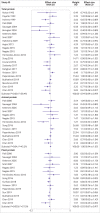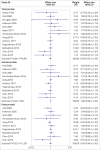Dietary intake of total, animal, and plant proteins and risk of all cause, cardiovascular, and cancer mortality: systematic review and dose-response meta-analysis of prospective cohort studies
- PMID: 32699048
- PMCID: PMC7374797
- DOI: 10.1136/bmj.m2412
Dietary intake of total, animal, and plant proteins and risk of all cause, cardiovascular, and cancer mortality: systematic review and dose-response meta-analysis of prospective cohort studies
Abstract
Objective: To examine and quantify the potential dose-response relation between intake of total, animal, and plant protein and the risk of mortality from all causes, cardiovascular disease, and cancer.
Design: Systematic review and meta-analysis of prospective cohort studies.
Data sources: PubMed, Scopus, and ISI Web of Science until December 2019, and references of retrieved relevant articles.
Study selection: Prospective cohort studies that reported the risk estimates for all cause, cardiovascular, and cancer mortality in adults aged 18 or older.
Data synthesis: Random effects models were used to calculate pooled effect sizes and 95% confidence intervals for the highest versus lowest categories of protein intake and to incorporate variation between studies. Linear and non-linear dose-response analyses were done to evaluate the dose-response relations between protein intake and mortality.
Results: 32 prospective cohort studies were included in the systematic review and 31 in the meta-analysis. During the follow-up period of 3.5 to 32 years, 113 039 deaths (16 429 from cardiovascular disease and 22 303 from cancer) occurred among 715 128 participants. Intake of total protein was associated with a lower risk of all cause mortality (pooled effect size 0.94, 95% confidence interval 0.89 to 0.99, I2=58.4%, P<0.001). Intake of plant protein was significantly associated with a lower risk of all cause mortality (pooled effect size 0.92, 95% confidence interval 0.87 to 0.97, I2=57.5%, P=0.003) and cardiovascular disease mortality (pooled hazard ratio 0.88, 95% confidence interval 0.80 to 0.96, I2=63.7%, P=0.001), but not with cancer mortality. Intake of total and animal protein was not significantly associated with risk of cardiovascular disease and cancer mortality. A dose-response analysis showed a significant inverse dose-response association between intake of plant protein and all cause mortality (P=0.05 for non-linearity). An additional 3% energy from plant proteins a day was associated with a 5% lower risk of death from all causes.
Conclusions: Higher intake of total protein was associated with a lower risk of all cause mortality, and intake of plant protein was associated with a lower risk of all cause and cardiovascular disease mortality. Replacement of foods high in animal protein with plant protein sources could be associated with longevity.
© Author(s) (or their employer(s)) 2019. Re-use permitted under CC BY. No commercial re-use. See rights and permissions. Published by BMJ.
Conflict of interest statement
Competing interests: All authors have completed the ICMJE uniform disclosure form at http://www.icmje.org/coi_disclosure.pdf and declare: support from the Research Council of School of Nutritional Sciences and Dietetics of Tehran University of Medical Sciences, Tehran, Iran for the submitted work; no financial relationships with any organisation that might have an interest in the submitted work in the previous three years; no other relationships or activities that could appear to have influenced the submitted work.
Figures





Similar articles
-
Dietary intake and biomarkers of alpha linolenic acid and risk of all cause, cardiovascular, and cancer mortality: systematic review and dose-response meta-analysis of cohort studies.BMJ. 2021 Oct 13;375:n2213. doi: 10.1136/bmj.n2213. BMJ. 2021. PMID: 34645650 Free PMC article.
-
Fruit and vegetable consumption and mortality from all causes, cardiovascular disease, and cancer: systematic review and dose-response meta-analysis of prospective cohort studies.BMJ. 2014 Jul 29;349:g4490. doi: 10.1136/bmj.g4490. BMJ. 2014. PMID: 25073782 Free PMC article. Review.
-
Dietary protein intake and all-cause and cause-specific mortality: results from the Rotterdam Study and a meta-analysis of prospective cohort studies.Eur J Epidemiol. 2020 May;35(5):411-429. doi: 10.1007/s10654-020-00607-6. Epub 2020 Feb 19. Eur J Epidemiol. 2020. PMID: 32076944 Free PMC article.
-
Association between total, animal, and plant protein intake and type 2 diabetes risk in adults: A systematic review and dose-response meta-analysis of prospective cohort studies.Clin Nutr. 2024 Aug;43(8):1941-1955. doi: 10.1016/j.clnu.2024.07.001. Epub 2024 Jul 10. Clin Nutr. 2024. PMID: 39032197
-
Whole-Grain Intake and Mortality from All Causes, Cardiovascular Disease, and Cancer: A Systematic Review and Dose-Response Meta-Analysis of Prospective Cohort Studies.Adv Nutr. 2016 Nov 15;7(6):1052-1065. doi: 10.3945/an.115.011635. Print 2016 Nov. Adv Nutr. 2016. PMID: 28140323 Free PMC article. Review.
Cited by
-
Animal- and Plant-Based Protein Sources: A Scoping Review of Human Health Outcomes and Environmental Impact.Nutrients. 2022 Dec 1;14(23):5115. doi: 10.3390/nu14235115. Nutrients. 2022. PMID: 36501146 Free PMC article. Review.
-
Plant protein reduces serum cholesterol levels in hypercholesterolemia hamsters by modulating the compositions of gut microbiota and metabolites.iScience. 2021 Nov 15;24(12):103435. doi: 10.1016/j.isci.2021.103435. eCollection 2021 Dec 17. iScience. 2021. PMID: 34927019 Free PMC article.
-
Grain Nutrients Variability in Pigeonpea Genebank Collection and Its Potential for Promoting Nutritional Security in Dryland Ecologies.Front Plant Sci. 2022 Jul 11;13:934296. doi: 10.3389/fpls.2022.934296. eCollection 2022. Front Plant Sci. 2022. PMID: 35898221 Free PMC article.
-
Fasting-Mimicking-Diet does not reduce skeletal muscle function in healthy young adults: a randomized control trial.Eur J Appl Physiol. 2022 Mar;122(3):651-661. doi: 10.1007/s00421-021-04867-2. Epub 2022 Jan 16. Eur J Appl Physiol. 2022. PMID: 35034194 Clinical Trial.
-
The association of energy and macronutrient intake at breakfast and cardiovascular disease in Chinese adults: From a 14-year follow-up cohort study.Front Nutr. 2023 Mar 20;10:1093561. doi: 10.3389/fnut.2023.1093561. eCollection 2023. Front Nutr. 2023. PMID: 37020811 Free PMC article.
References
-
- World Health Organization NCD mortality and morbidity. World Health Organisation, 2016.
Publication types
MeSH terms
Substances
LinkOut - more resources
Full Text Sources
